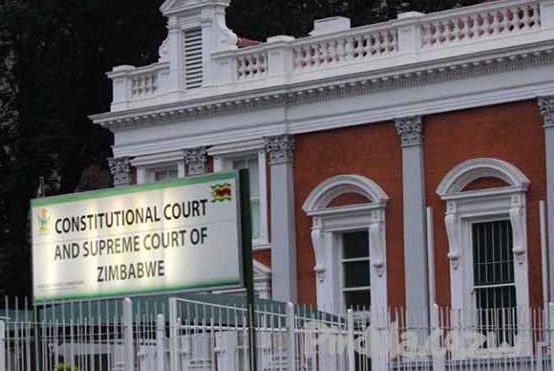
Apr 2, 2020 | News
The ICJ welcomes the decision by the Constitutional Court of Zimbabwe to invalidate the enactment of Constitutional Amendment Bill (No. 1) of 2017 in Gonese and Anor v Parliament of Zimbabwe and 4 Ors. The judgment restores important Constitutional guarantees for the independence of the judiciary in Zimbabwe.
Zimbabwe adopted a new Constitution in 2013 and one of the progressive elements of this Constitution was its provisions regulating the appointment of judicial leaders such as the Chief Justice, Deputy Chief Justice and Judge President of the High Court. These judicial leaders perform important administrative functions with a huge impact on access to justice for the public.
For example, the Chief Justice is the head of the Judicial Service Commission (JSC) and therefore, presides over processes to select and recommend candidates for judicial appointment.
The Judge President is responsible for case allocation in the High Court and therefore, selects judges to sit on cases. It is important that the procedures for appointing these judicial leaders be transparent and independent of executive control in order to maintain the independence and impartiality of judges as well as promote public confidence in the judiciary.
The 2013 Constitution ensured this by prescribing procedures which accorded the executive a constrained role in the selection and appointment of these judicial leaders.
For example, the process of selecting these office bearers was to be led by an independent Judicial Service Commission (JSC) which would publicly advertise the vacancies, shortlist candidates, conduct interviews that are open to the public and recommend candidates for appointment by the President. The President was required to appoint only from the shortlist submitted by the JSC.
In 2017, the then-President of Zimbabwe Robert Mugabe signed into law a constitutional amendment bill which sought to change these provisions and give the President the authority to select and appoint these judicial leaders without conducting public interviews and without being constrained or restricted to the shortlist provided by the JSC.
The enactment of this constitutional amendment bill was challenged in the Constitutional Court on grounds that the amendment had been adopted and enacted into law without following due process.
In its judgment, the Constitutional Court concluded that, “It is declared that the passing of Constitutional Amendment Bill (No. 1) of 2017 by the Senate on 01 August 2017 was inconsistent with the provisions of s 328(5) of the Constitution, to the extent that the affirmative votes did not reach the minimum threshold of two-thirds of the membership of the House. Constitutional Amendment Bill (No. 1) of 2017 is declared invalid to the extent of the inconsistency. The declaration of invalidity shall have effect from the date of this order but is suspended for a period of one hundred and eighty days, subject to the provisions of paragraph 1(b).”
The Court directed the Senate to conduct a vote in accordance with the procedure for amending the Constitution prescribed by s 328(5) of the Constitution within one hundred and eighty days of the order given. Failure to do so will render the declaration of invalidity of Constitutional Amendment Bill (No. 1) of 2017 final, said the Court.
Commenting on this judgment, ICJ Africa Director Arnold Tsunga said: “This is a positive judgment which underscores the vital principle of legality, particularly that changes to the Constitution must be processed and enacted in strict accordance with the laid out procedures. Respect for the Constitution, and ensuring the independence of the judiciary, are fundamental elements of the rule of law; both are advanced by this judgment.”
The decision by the Constitutional Court comes at a time when the Parliament of Zimbabwe has gazetted further proposed changes to the Constitution, which amongst other things seek to give the executive a stronger role in the selection and appointment of judges to the Supreme Court and Constitutional Court.
These proposed changes would undermine judicial independence and undercut public confidence in the independence and impartiality of the judiciary. Further, these proposed changes are contrary to international and African standards. For instance, the United Nations Basic Principles on the Independence of the Judiciary enjoin member states to ensure that “Any method of judicial selection shall safeguard against judicial appointments for improper motives.”
The African Commission on Human and Peoples’ Rights’ Principles and Guidelines on the Right to a Fair Trial and Legal Assistance in Africa further provide that, “The process for appointments to judicial bodies shall be transparent and accountable and the establishment of an independent body for this purpose is encouraged.” The ICJ therefore, calls upon the government of Zimbabwe to reconsider its decision to proceed with these proposed changes to the Constitution.
Contact
Arnold Tsunga, t: +26377728 3248; e: arnold.tsunga@icj.org
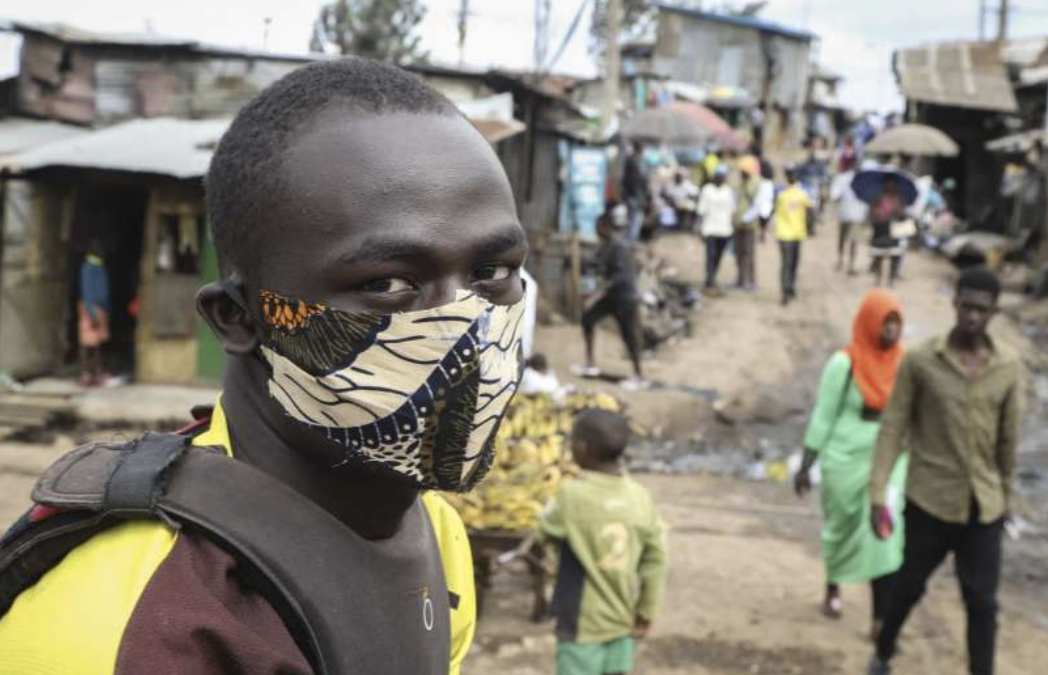
Mar 27, 2020 | News
The ICJ today called on the responsible authorities to adopt urgent measures to ensure the equal protection of the right to health and life of the country’s inhabitants in the wake of the growing COVID-19 pandemic.
The call came amidst indications that official response has been inadequate and poorly conceived.
Although Zimbabwe has only three officially confirmed COVID-19 cases and one casualty so far, the true figures are likely to be higher.
Media reports indicate that the health care facilities designated to deal with COVID-19 cases are severely under equipped. Doctors and nurses have announced that they are withdrawing their services because government is failing to provide them with protective clothing such as masks and gloves.
“The ICJ is deeply concerned by the poor state of preparedness of the Zimbabwean Government to handle COVID-19 cases,” said Arnold Tsunga, ICJ African Programme Director.
“The COVID-19 pandemic has brought to the fore cracks in health systems and presented governments everywhere with unprecedented challenges. The government’s response should however remain steeped in obligations espoused in the Constitution and international legal instruments to which Zimbabwe is a party,” he added.
The ICJ called on the Government of Zimbabwe to take urgent measures, include those aimed at ensuring that its healthcare system can provide for adequate screening, testing and care for COVID-19 patients.
The ICJ said that the Government must also investigate reports of the mishandling of patients, increase transparency and regular communication with the public and dedicate more resources to dealing with the COVID-19 pandemic.
Background
Zimbabwe announced its first confirmed case of COVID-19 on 21 March. The first casualty was recorded on 23 March. On 25 March 2020, the Ministry of Health and Child Welfare reported that a total of 100 people had been tested for COVID-19. Of these, 96 were negative, three tested positive and one test was found to be inconclusive.
Zimbabwe is a party to the International Covenant on Economic, Social and Cultural Rights (ICESCR), which imposes a duty to protect the right of everyone to enjoyment of the highest attainable standard of physical and mental health. Zimbabwe is also party to the International Covenant on Civil and Political Rights and the African Charter on Human and Peoples Rights, both of which guarantee the right to life.
Pursuant to Section 76 (1) of the Constitution of Zimbabwe, the government must provide access to basic health care services to all citizens and residents. Further, section 76 (3) of the Constitution enjoins government to ensure that no person is denied emergency medical treatment in any health care facility. In addition, government has an obligation, under section 51 of the Constitution, to protect human dignity.
The Committee on Economic, Social and Cultural Rights has set out the minimum standards which must be fulfilled at all times for States that are party to the IECSCR;
- Quality: Heath care facilities should be equipped with necessary equipment and medicine including safe and adequate water, sanitation and skilled medical professionals.
- Availability: Health care facilities with adequately trained and fairly-paid medical personnel and essential medicines should be made available to all.
- Accessibility: Health care facilities should be accessible to all without discriminating. Accessibility also includes physical accessibility, economic accessibility and access to information.
- Acceptability: Health care services should be provided in a manner that complies with medical ethics.
Measures undertaken by the Government of Zimbabwe, in response to the COVID-19 pandemic must adhere to these minimum standards. However, the ICJ has noted the following allegations and reports from credible media sources;
- Gross under-testing of people despite showing most of the COVID-19 symptoms;
- Absence of protective gear for health care workers;
- Lack of training of health care workers on the proper handling of COVID-19 related patients;
- Mishandling/ill treatment of patients at COVID-19 health care centres;
- Absence of equipment such as ventilators and respirators;
- Absence of running water at designated COVID-19 health care centres;
- Insufficient staffing at the designated COVID-19 care and isolation centres, as a result of some doctors and nurses having gone on strike;
- Government is establishing fully equipped COVID-19 health care facilities but exclusively for the political elites and their associates.
Contact:
Arnold Tsunga, Director of the ICJ Africa Regional Programme, t: +263 77 728 3248, e: arnold.tsunga(a)icj.org
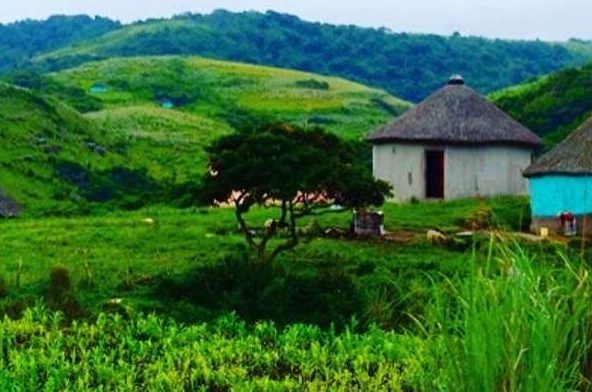
Mar 25, 2020 | News
The ICJ today called on the South African government to take urgent and immediate measures to ensure the full protection human rights, including economic, social and cultural rights, in the context of the COVID 19 epidemic.
The call comes as South Africa’s 21-day nationwide lockdown is poised to commence tomorrow, 26 March 2020. As it stands the human rights of the majority of South African residents are under serious threat.
“The ICJ is calling on the South African government to take effective measures ensure that addressing one human rights crisis does need lead to new human rights pressures” said Arnold Tsunga, Director of or the ICJ Africa Programme.
“We therefore call on the authorities to take three urgent steps: 1) Declare a moratorium on all evictions; 2) Ensure emergency provision of water to all; and 3) publically repudiate xenophobic statements made by Minister Khumbudzo Ntshavheni and affirm non-citizens rights to work”.
- Declaration of a moratorium on all evictions:
In the context of COVID-19, evictions are particularly dangerous and life-threatening. Evictions risk the further spread of COVID-19 and make it impossible to stay at home as the World Health Organization has advised.
The UN Special Rapporteur on the Right to Housing, has called for a global ban on evictions worldwide, stressing that: “The logical extension of a logical stay at home policy is a global ban on evictions. There must be no evictions of anyone, anywhere, for any reason. Simply put: a global ban on evictions will save lives”. In South Africa, local social movements and human rights organizations have called for a “moratorium” on evictions, as has Abahlali BaseMjondolo a movement of tens of thousands of “shack dwellers” across the country.
The ICJ calls on President Ramaphosa to declare a moratorium on evictions immediately before the commencement of the nationwide lockdown. South Africa must do so to meet its international legal obligations to protect the rights to housing and health.
- Provision of emergency access to water before the lockdown commences:
Many people in South Africa live in informal settlements and rural settings in which access to water, sanitation and basic services are inadequate or inconsistent. The simple instruction of washing one’s hands to prevent the spread of the virus is extremely difficult, if not impossible, for many.
The President announced on 23 March that “emergency water supplies” would be provided in “informal settlements and rural areas”. However, reports from around the country suggest that with lockdown beginning tomorrow many major informal settlements, including Khayelitsha in Cape Town, still do not have sufficient access to such emergency water.
The ICJ calls on President Ramaphosa to ensure that provision is made for all South Africans to have access to basic services, including water, before the commencement of national lockdown. South Africa must do so to meet its international legal obligations to protect the right to water.
- Protecting the right to work of “everyone” including non-citizens:
On 24 March 2020 speaking on national television, Minister of Small Business and Development in South Africa Khumbudzo Ntshavheni said that only spaza shops “owned by South Africans and managed and run by South Africans” will be allowed to continue operating during nationwide-lockdown, ostensibly to ensure the quality of goods and food.
This statement is discriminatory and in violation of South Africa’s commitments in terms of its own Constitution and international human rights law, to ensure non-discrimination and equal protection of the law. It risks a resurgence of existing xenophobic sentiment at a time of crisis which South Africa can ill afford and threatens the livelihood of foreign nationals.
The ICJ calls on President Ramaphosa to withdraw the statement immediately and reaffirm the internationally recognized right to equality of non-citizens including their right to work.
Contact:
Tim Fish Hodgson, ICJ Legal Adviser, e: tim.hodgson(a)icj.org ; c: +2782871990
Shaazia Ebrahim, ICJ Media Officer, e: shaazia.ebrahim(a)icj.org ; c: +27716706719
Background:
The global Covid-19 pandemic has led South African president Cyril Ramaphosa to announce a 21-day nationwide lockdown which will be effective on 26 March at midnight. This follows on from South Africa’s declaration of a “national disaster” on 15 March and the publication of disaster regulations governing the disaster response.
Global consensus on best practice to combat COVID-19, as recommended by the World Health Organization, is for people to stay at home, maintain social distance and intensify hygiene measures including through frequent washing of hands. However, South Africa has well-documented and extremely high levels of poverty and inequality. A number of problems in complying with global best practice in response to COVID-19.
The disaster regulations require that measures taken to combat COVID-19 are implemented “as far as possible, without affecting service delivery in relation to the realisation of the rights” including the rights to housing and basic services, healthcare, social security and education.
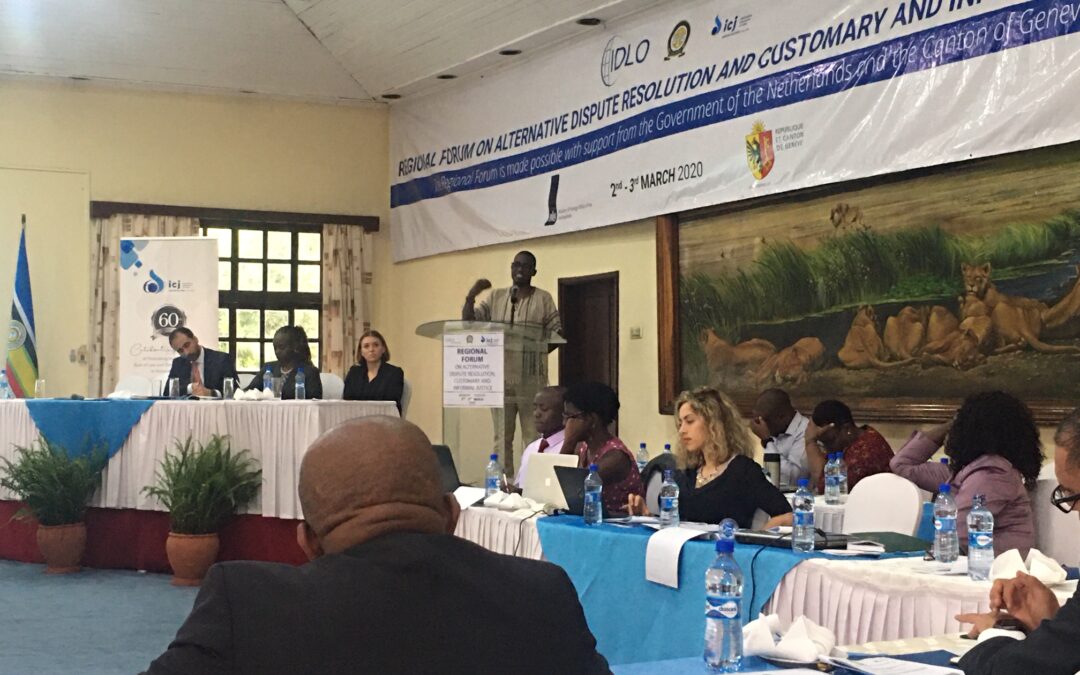
Mar 1, 2020 | Events, News
For the 10th annual Geneva Forum of Judges and Lawyers, the ICJ has partnered with the International Development Law Organization and the ICJ Kenya Section, to organise in Nairobi a high-level regional Forum on alternative dispute resolution and indigenous and other traditional or customary justice systems in Africa.
Under the auspices of the Judiciary of Kenya, the “Regional Forum on Alternative Dispute Resolution & Customary and Informal Justice: Advancing SDG16 and Pathways to Justice” will provide a platform to allow for a deeper reflection on access to justice through alternative and indigenous or other traditional or customary justice systems, providing greater insight into local realities, concerns and approaches and exploring existing lessons, illustrations, and good practices.
The Forum will also facilitate the identification of culturally appropriate, people-centered, sustainable and effective paths for policy and programming that reduce existing justice gaps as well as address challenges in diverse contexts.
Invited justice champions from national governments, the formal and informal justice sectors, and civil society will share insights on ongoing justice sector reforms and policy development that aim to provide alternatives to or complement formal courts, curb rights-abrogating practices, and contribute to inclusive and peaceful societies.
A concept note is available in PDF format here: NairobiConferenceConceptNote
The programme is available in PDF format here: NairobiConferenceAgenda
The final report of the Forum is available in PDF format here.
The Forum is made possible with support from the Government of the Netherlands and the Republic and Canton of Geneva.
For further background on the ICJ Geneva Forum of Judges and Lawyers, and its ongoing global project on indigenous and other traditional or customary justice systems, click here.
A compilation of international sources is available here.
For more information contact matt.pollard(a)icj.org

Feb 28, 2020 | News
The ICJ today welcomed the judgement of the Canadian Supreme Court in the Case of Araya v, Nevsun, which allows a civil lawsuit by a group of Eritrean plaintiffs to proceed against Canadian company Nevsun Resources Ltd. for its alleged involvement in forced labour, slavery, torture and other serious human rights abuses against plaintiffs.
The ICJ together with Amnesty International-Canada intervened in the case as a third party, arguing that Canada’s common law should be read in a manner consistent with the right to an effective remedy for human rights violations under international law and the Canadian Charter of Rights and Freedoms.
“This judgment is a landmark achievement for workers and other victims of human rights violations as well for international rule of law and justice,” said Carlos Lopez, Senior Legal adviser at the ICJ.
“The Supreme Court of Canada has shown that misapplied legal doctrine should not stand in the way of people’s right to effective remedy and reparations,” he added.
In the case, the Supreme Court of Canada rejected the company’s contention that the “act of state doctrine” would preclude the case from going forward.
The Court concluded that this doctrine is not in fact part of Canadian law.
The company also contended that the allegations of breach of customary international law could only be applicable to States and not to the company itself.
The Court, however, held that customary international law, including customary human rights law, is part of Canadian law and could apply to Nevsun as a corporate entity.
In a significant victory for the plaintiffs and other similarly situated alleged victims, the Supreme Court has allowed the case to proceed, dismissing jurisdictional and procedural objections from Nevsun.
The proceedings before the Supreme Court originated in an appeal by the defendant company Nevsun Resources Ltd against the British Columbia Court of Appeal’s judgment of 2017 which upheld the rights of claimants to sue in Canada.
The claim filed in 2015 argued that Nevsun Resources was involved in various ways in the practice of forced labour, slavery, torture, cruel, inhuman or degrading treatment, and crimes against humanity at the Bisha mine (picture) against hundreds of Eritreans who were conscripted into the Eritrean National Service Programme and forced to working in the mine operated jointly by Nevsun and Eritrean State companies.
The claimants were allegedly forced to work in the Bisha mine and fled the country to find refuge in Canada, where they sued Nevsun.
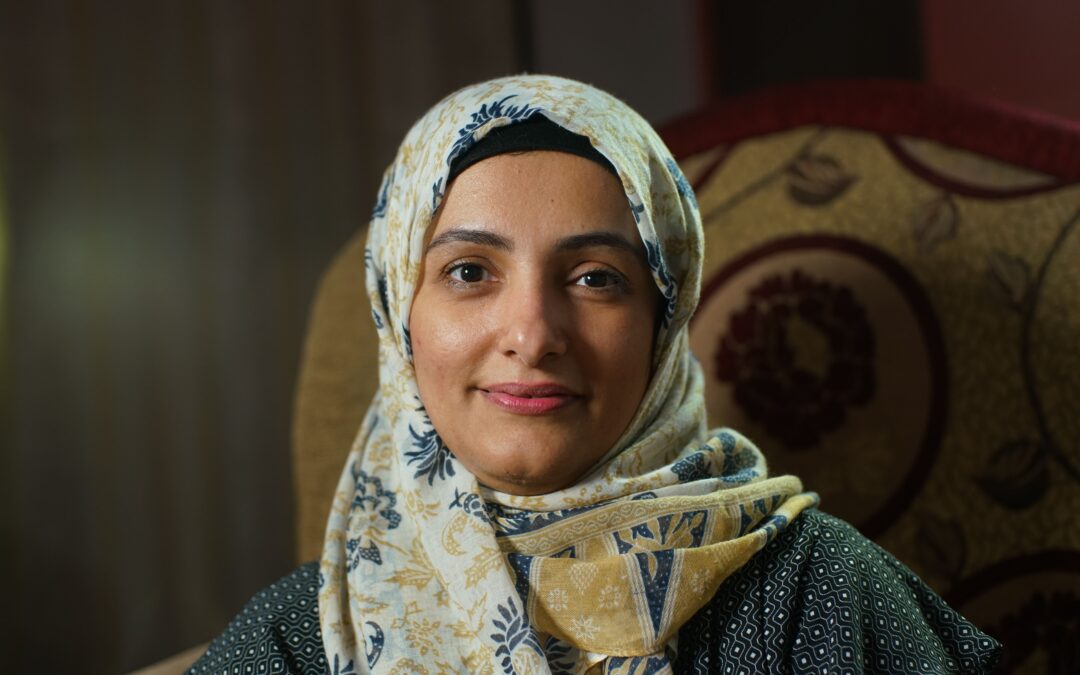
Feb 19, 2020 | News
Huda Al- Sarari, Yemeni lawyer and human rights defender, is the 2020 Martin Ennals Award laureate. She was among three women selected as finalists by a jury of ten of the world’s leading human rights organizations, including the ICJ, along with Sizani Ngubane, South Africa, and Norma Librada Ledezma, Mexico.
The 2020 Martin Ennals Award ceremony, co-hosted by the Martin Ennals Foundation and the City of Geneva, was held today, and for the first time in the history of the Award, all three finalists are women.
“Women human rights defenders are subject to the same risks as every human rights defender, but as women, they also face certain forms of violence and violations due to their gender. They are often stigmatized and ostracized by community leaders, faith- based groups and even family members,” said the Mayor of the City of Geneva, Sandrine Salerno.
“The Martin Ennals Foundation is particularly proud to honour and support three resilient women human rights defenders this year, our laureate Huda Al-Sarari, as well as our two finalists Sizani Ngubane and Norma Librada Ledezma for their achievements. We hope that the award will shed a light on their achievements, and strengthen protection mechanisms around them,” said Philippe Currat, President of the Board of the Martin Ennals Foundation.
Huda Al-Sarari is a Yemeni lawyer and human rights defender who graduated in Sharia and Law from Aden University. She also holds a masters in Women’s Studies and Development from the Women’s Centre at Aden University. Over the last years, Huda investigated, exposed and challenged the enforced disappearances that occurred as a result of secret prisons run by foreign governments in Yemen where thousands of men and boys have suffered from arbitrary detention, torture and extrajudicial killings. She collected evidence on more than 250 cases of the abuse taking place within those prisons.
“Being a human rights defender in Yemen is extremely challenging, and being a woman makes this even more difficult. In a male-dominated society, I have to prove myself maybe ten times more than a man,” she said.
Despite the threats, defamation campaigns and sacrifices she and her family endured, Huda continues to stand alongside the families of those who have disappeared.
“Receiving the 2020 Martin Ennals Award for human rights defenders means the world to me. It gives me great strength and emboldens me to continue this fight for justice. I believe the Award will be incredibly important in drawing attention to the continual plight of victims of arbitrary detention, abuse and torture in Yemen,” she added.
“We commend Huda for the work that she conducted, not only against the backdrop of the ongoing Yemeni civil war, but also, in a country where women still struggle to express their political and civil rights. Huda’s legacy is crucial as her thorough investigations and search for accountability will serve to bring justice for human rights violations occurred during the conflict,” said Hans Thoolen, Chair of the Martin Ennals Award Jury.
The two finalists of the Martin Ennals Award this year are Sizani Ngubane (South Africa) and Norma Librada Ledezma (Mexico).
Sizani is a human rights defender who advocates for land rights for women in rural areas on South Africa. She also supports women to access education, and fights for the end of the traditional practice of Ukuthwala, which is the abduction and forced marriage of young girls and women.
Norma is the founder of Justicia para Nuestras Hijas. She has supported over 200 investigations into cases of feminicide, enforced disappearance and human trafficking in Chihuahua, Mexico.
Both were praised by the Martin Ennals Jury member organizations for their commitment and tremendous achievements in their respective countries.
Additional information
The City of Geneva has hosted the Award ceremony since 2008, together with the Martin Ennals Foundation, as part of its deep commitment to the defense of human rights. The support of the City, by means of its Service for International Solidarity, reflects its mission to promote human rights both internationally and
The Jury of the Martin Ennals Award is comprised of ten of the world’s leading human rights organizations: the ICJ, Amnesty International, FIDH, Human Rights First, HURIDOCS, International Service For Human Rights, Brot für die Welt (Bread for the World), Front Line Defenders, Human Rights Watch and the World Organization Against Torture.
Download
Universal-MEA2020bios-News-2019-ENG (full bios of finalists, in PDF)
Universal-MEA2020winner-News-Press releases-2019-ARA (full story in Arabic, PDF)
Universal-MEA2020bios-News-2019-ARA (full bios of finalists, in Arabic, PDF)
Contact
Olivier van Bogaert, Director Media & Communications, ICJ representative in the MEA Jury, t: +41 22 979 38 08 ; e: olivier.vanbogaert(a)icj.org
Watch the ceremony as it happened
https://www.facebook.com/MartinEnnals/videos/2552501445008021/










